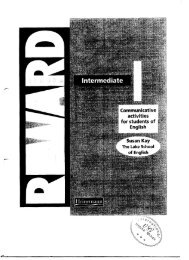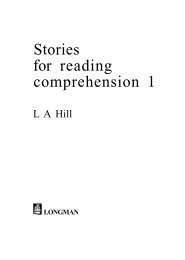- Page 1 and 2:
Л. КУТУЗОВПрактиче
- Page 3 and 4:
27. час / часы28. time29. fi
- Page 5 and 6:
Сначала несколько
- Page 7 and 8:
2. Второе основное о
- Page 9 and 10:
Девочка читает кни
- Page 11 and 12:
Диктант пишется уч
- Page 13 and 14:
ИЗ КАКИХ ДЕТАЛЕЙ СО
- Page 15 and 16:
Мама сейчас спит.По
- Page 17 and 18:
2 - You will ------3 He will ------
- Page 19 and 20:
Почаще задавайте с
- Page 21 and 22:
этот глагол тоже мо
- Page 23 and 24:
— Давай сыграем ве
- Page 25 and 26:
Промежуток времени
- Page 27 and 28:
We have been thinking about buying
- Page 29 and 30:
2 has smoked (has — форма Pr
- Page 31 and 32:
В прошлом году ей б
- Page 33 and 34:
1. Они приехали вчер
- Page 35 and 36:
в) still может иметь з
- Page 37 and 38:
Согласимся, любой в
- Page 39 and 40:
1. У меня вообще нет
- Page 41 and 42:
They will neither eat nor drink. =>
- Page 43 and 44:
— Whose cigars are these? — The
- Page 45 and 46:
- Не все существите
- Page 47 and 48:
- С названиями маро
- Page 49 and 50:
Обычно в грамматич
- Page 51 and 52:
Иногда окна моют во
- Page 53 and 54:
She has been sleeping for six hours
- Page 55 and 56:
to listen to smb. / smth. => слу
- Page 57 and 58:
They are waiting for us downstairs.
- Page 59 and 60:
I get up at seven o'clock. => Я в
- Page 61 and 62:
если существительн
- Page 63 and 64:
В предложении любо
- Page 65 and 66:
Практически получа
- Page 67 and 68:
If she wants anything, she need onl
- Page 69 and 70:
21 twenty-one twenty-first22 twenty
- Page 71 and 72:
1/2 = а / one half => полови
- Page 73 and 74:
2. Для длинных (сост
- Page 75 and 76:
Most of them will not be able to co
- Page 77 and 78:
Для образования пр
- Page 79 and 80:
слово any и производ
- Page 81 and 82:
Для обозначения пр
- Page 83 and 84:
На прошлой неделе н
- Page 85 and 86:
2. В этой бутылке ес
- Page 87 and 88:
Все возможные обра
- Page 89 and 90:
Do you like my room? => Тебе н
- Page 91 and 92:
2. Специальные вопр
- Page 93 and 94:
1 2 3 4 5вопросительно
- Page 95 and 96:
— Are you sleeping or reading?
- Page 97 and 98:
соединяемых каким-
- Page 99 and 100:
описания любого де
- Page 101 and 102:
after => после того, ка
- Page 103 and 104:
предложении: прида
- Page 105 and 106:
Если он будет спать
- Page 107 and 108:
Не estimated that they had gone a
- Page 109 and 110:
7. Если радио будет
- Page 111 and 112:
should have been should havegivenwo
- Page 113 and 114:
wish стоит обычно с м
- Page 115 and 116:
какая-то возможнос
- Page 117 and 118:
not to be ~~~~ing;not to have been
- Page 119 and 120:
б) действие, котото
- Page 121 and 122:
Глагол to feel может и
- Page 123 and 124:
С субъектным инфин
- Page 125 and 126:
1. Я рад тебя видеть.
- Page 127 and 128:
Having written the letter, he calle
- Page 129 and 130:
подлежащее сказуем
- Page 131 and 132:
условия:в этом случ
- Page 133 and 134:
но очень часто в ру
- Page 135 and 136:
to intend => намереватьс
- Page 137 and 138:
We are certain of / about this. =>
- Page 139 and 140:
I was touched to find them in the r
- Page 141 and 142:
They postponed / put off leaving be
- Page 143 and 144:
By working hard he gained rapid pro
- Page 145 and 146:
Waiter, I'd like the menu, please.
- Page 147 and 148:
By the way, I also need money. =>
- Page 149 and 150:
3. Ставится вместе с
- Page 151 and 152:
6. В английском язык
- Page 153 and 154:
I do want to help you! => Я хоч
- Page 155 and 156:
to have a swim => поплават
- Page 157 and 158:
I won't do it again. => Я боль
- Page 159 and 160:
Should they call you, come and get
- Page 161 and 162:
The work having been finished, we w
- Page 163 and 164: — если глагол сост
- Page 165 and 166: forbid => запрещать (не
- Page 167 and 168: 6. Используется в не
- Page 169 and 170: Is your father at home? =” Тво
- Page 171 and 172: Let me introduce you to my wife. =>
- Page 173 and 174: Не studies at the medical college
- Page 175 and 176: to call by (at some place) => за
- Page 177 and 178: When you get to know her better, yo
- Page 179 and 180: It will take you much time. => Эт
- Page 181 and 182: Let me have / take a squint at it.
- Page 183 and 184: 14. предлагать / пред
- Page 185 and 186: Our sister is working now. => На
- Page 187 and 188: value => стоимость / це
- Page 189 and 190: I'm only asking for a loan — I'll
- Page 191 and 192: (You will turn) First right, second
- Page 193 and 194: Each time I come here they say you
- Page 195 and 196: 31. быть на диете / ху
- Page 197 and 198: pair =>1. два предмета,
- Page 199 and 200: Be seated, please. => Пожалу
- Page 201 and 202: What did you bring all these books
- Page 203 and 204: It was a horrible crime. => Это
- Page 205 and 206: ... used to do smth. — обозн
- Page 207 and 208: That's quite another thing. => Эт
- Page 209 and 210: at (the) best / worst => в луч
- Page 211 and 212: 7. Извините. / Прошу
- Page 213: 10. При расставанииGo
- Page 217 and 218: What is your occupation? => Чем
- Page 219 and 220: Если в специальном
- Page 221 and 222: I meant only the best. => Я хот
- Page 223 and 224: Surely you saw them. => Неуже
- Page 225 and 226: For the rest, it was very good. =>
- Page 227 and 228: At any rate, ... => Во всяко
- Page 229 and 230: to see no point in doing smth. =>
- Page 231 and 232: At first he was awkward, but soon h
- Page 233 and 234: on;outa = out of;'sail right = it's
- Page 235 and 236: to resist — resistant;to differ
- Page 237 and 238: -ish:-Poland — Polish (назва
- Page 239: subway;sub-conscious;sub-committeeu








